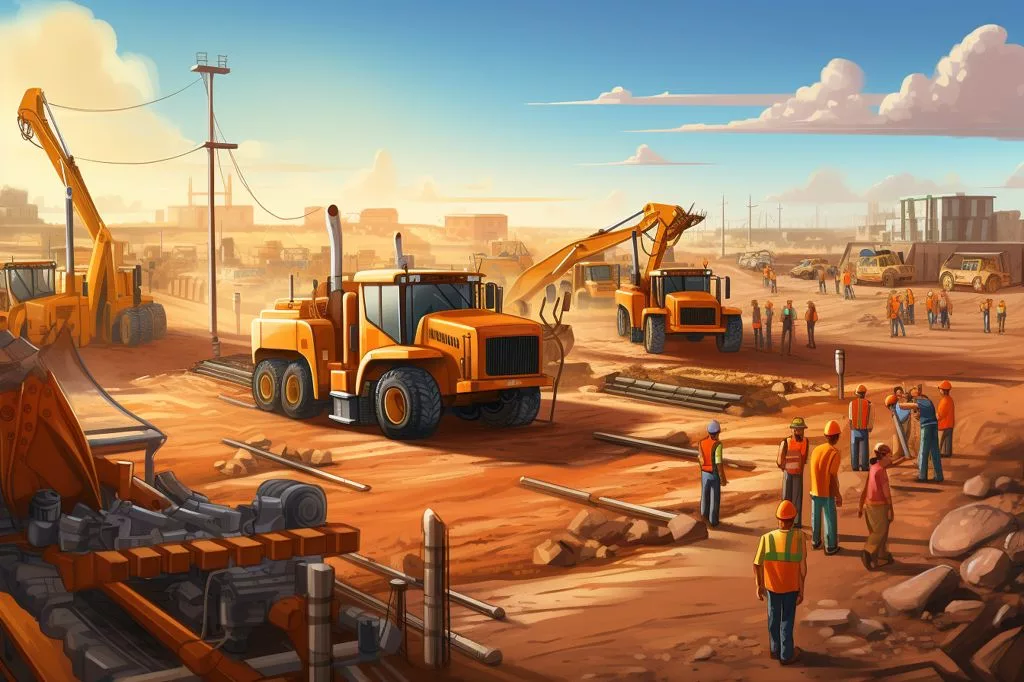South Africa’s freight and rail industry is undergoing a rebirth as the government focuses on modernization and rejuvenation. The National Logistics Crisis Committee (NLCC) is working with Transnet Freight Rail (TFR) to address challenges in rail, port, and road transport systems, while promoting public awareness of ongoing reforms. Investment in infrastructure and technology can lower transportation costs, improve connectivity, and open new opportunities for businesses and communities. The upcoming GCIS webinar provides an opportunity to learn about the ongoing reforms and their potential benefits for South Africa’s economy and environment.
What is the government doing to modernize freight and rail in South Africa?
The government formed the National Logistics Crisis Committee (NLCC), which is working with Transnet Freight Rail (TFR) to modernize South Africa’s freight and rail sector. The NLCC is addressing the challenges faced by rail, port, and road transport systems, coordinating efforts among stakeholders, and promoting public awareness of ongoing reforms. TFR, a key partner, aims to develop its infrastructure and broaden its services to support the South African economy. Investment in infrastructure and technology can lower transportation costs, improve connectivity, and open new opportunities for businesses and communities.
A rebirth is taking place within South Africa’s freight and rail sector as the government focuses on modernization and rejuvenation. To support this goal, the Government Communication and Information System (GCIS) has organized a webinar on October 26, 2023, bringing together experts to offer valuable insights and advice on the country’s freight and rail landscape. The webinar will raise awareness of the ongoing reform efforts spearheaded by Operation Vulindlela’s National Logistics Crisis Committee (NLCC). This committee is tasked with tackling challenges in rail, port, and road infrastructure, as well as working with the Department of Public Enterprises and Transnet Freight Rail (TFR) to enhance the efficiency and competitiveness of the transport system.
The Present State of Freight and Rail in South Africa
In recent years, South Africa’s freight and rail industry has grappled with a range of challenges. Aged infrastructure, inadequate investment, and poor maintenance have led to a less effective and competitive transport system. To counteract these issues, the government formed the NLCC and joined forces with TFR to devise a plan for the modernization of freight transportation.
The Critical Role of Operation Vulindlela’s National Logistics Crisis Committee
The NLCC plays a vital part in transforming South Africa’s freight and rail sector by addressing the difficulties faced by rail, port, and road transport systems, and coordinating efforts among various stakeholders. The committee collaborates closely with the Department of Public Enterprises and TFR to design and execute strategies for improving the efficiency and competitiveness of the transport system. Additionally, the NLCC is responsible for promoting awareness of the ongoing reforms and ensuring that the public and media comprehend the changes occurring within the industry.
Collaboration with Transnet Freight Rail
TFR, a key partner in these reform efforts, is a division of Transnet, South Africa’s largest freight logistics company. TFR specializes in the transportation of various commodities, such as coal, iron ore, steel, and agricultural products. In collaboration with the NLCC, TFR aims to develop its infrastructure and broaden its services to better support the South African economy. The partnership between the NLCC and TFR underlines the significance of public-private cooperation in addressing the nation’s freight and rail challenges.
Raising Awareness through the Webinar
The upcoming webinar is an essential step in educating the public and media about the ongoing reforms in the freight and rail sector. By inviting experts to offer their insights and advice, the GCIS seeks to provide a thorough understanding of the current state of the industry and the enhancements underway. This event also presents an opportunity for media outlets to report on the discussions, disseminating information and raising awareness about the ongoing efforts to modernize South Africa’s freight and rail sector.
The Significance of Modernizing Freight and Rail
Revamping the freight and rail industry is crucial for South Africa’s economic growth and development. An efficient and competitive transport system can bolster trade, facilitate the flow of goods, and stimulate economic activity throughout the nation. Investment in infrastructure and technology can lower transportation costs, improve connectivity, and open new opportunities for businesses and communities.
Furthermore, revitalizing the freight and rail sector can contribute to sustainable development by reducing dependency on road transport, which frequently results in increased emissions, traffic congestion, and road deterioration. By enhancing rail infrastructure and services, South Africa can promote a shift toward eco-friendly transportation solutions and support a greener economy.
The Potential Outcomes of the Reforms
The ongoing reforms in the freight and rail sector offer substantial potential for South Africa’s economy and environment. By addressing the transport system’s challenges and implementing strategic enhancements, the NLCC and TFR can help establish a more efficient and competitive freight and rail network. This transformation will ultimately benefit businesses, communities, and the environment by fostering economic growth, improving connectivity, and enabling sustainable development.
As South Africa sets out to reinvigorate its freight and rail sector, the forthcoming GCIS webinar provides an opportunity to learn about the ongoing reforms and their possible effects on the country. The collaboration between the NLCC, TFR, and other stakeholders demonstrates the government’s dedication to improving the national transportation infrastructure and promoting a more sustainable economy. As the industry progresses, maintaining open communication and awareness is essential, ensuring that citizens and the media grasp the changes and their implications for South Africa’s future.
1. What is the National Logistics Crisis Committee (NLCC), and what is its role in modernizing South Africa’s freight and rail sector?
The NLCC is a committee formed by the government to address challenges in South Africa’s rail, port, and road transport systems, promoting public awareness of ongoing reforms and coordinating efforts among stakeholders. It works closely with Transnet Freight Rail (TFR) and the Department of Public Enterprises to develop strategies for improving the efficiency and competitiveness of the transport system.
2. What is Transnet Freight Rail (TFR), and how is it involved in modernizing the freight and rail industry in South Africa?
TFR is a division of Transnet, South Africa’s largest freight logistics company. It specializes in the transportation of various commodities, such as coal, iron ore, steel, and agricultural products. TFR is a key partner in the modernization of South Africa’s freight and rail sector, working closely with the NLCC to develop its infrastructure and broaden its services to better support the South African economy.
3. What are the challenges facing South Africa’s freight and rail industry, and how are they being addressed?
Aged infrastructure, inadequate investment, and poor maintenance have led to a less effective and competitive transport system in recent years. The NLCC, working with TFR and other stakeholders, is addressing these challenges by developing strategies for the modernization of freight transportation, enhancing the efficiency and competitiveness of the transport system.
4. What is the significance of modernizing South Africa’s freight and rail industry?
Revamping the freight and rail industry is crucial for South Africa’s economic growth and development. An efficient and competitive transport system can bolster trade, facilitate the flow of goods, and stimulate economic activity throughout the nation. Investment in infrastructure and technology can lower transportation costs, improve connectivity, and open new opportunities for businesses and communities. Additionally, it can contribute to sustainable development by promoting eco-friendly transportation solutions and supporting a greener economy.
5. What is the significance of the upcoming GCIS webinar?
The upcoming GCIS webinar provides an opportunity to learn about the ongoing reforms in South Africa’s freight and rail sector, their potential benefits for the country’s economy and environment, and the challenges faced by the industry. It also presents an opportunity for media outlets to report on the discussions, disseminating information and raising awareness about the ongoing efforts to modernize South Africa’s freight and rail sector.
6. How can modernizing South Africa’s freight and rail industry benefit businesses and communities?
Modernizing South Africa’s freight and rail industry can lower transportation costs, improve connectivity, and open new opportunities for businesses and communities. An efficient and competitive transport system can bolster trade, facilitate the flow of goods, and stimulate economic activity throughout the nation.
7. How can modernizing South Africa’s freight and rail industry contribute to sustainable development?
Revitalizing the freight and rail sector can contribute to sustainable development by promoting eco-friendly transportation solutions and supporting a greener economy. By enhancing rail infrastructure and services, South Africa can reduce dependency on road transport, which frequently results in increased emissions, traffic congestion, and road deterioration.
8. What are the potential outcomes of the reforms in South Africa’s freight and rail sector?
The ongoing reforms in South Africa’s freight and rail sector offer substantial potential for the country’s economy and environment. By addressing the transport system’s challenges and implementing strategic enhancements, the NLCC and TFR can establish a more efficient and competitive freight and rail network. This transformation will ultimately benefit businesses, communities, and the environment by fostering economic growth, improving connectivity, and enabling sustainable development.








